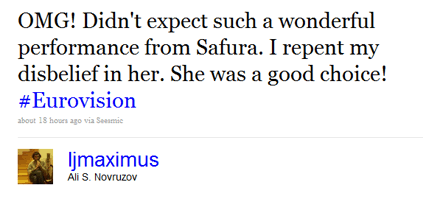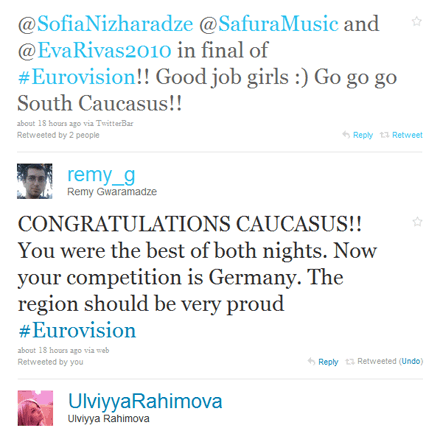This post is part of our special coverage Caucasus Conflict Voices [1].
 Although last night's second semi-final for this year's Eurovision Song Contest [2] in Oslo, Norway, has been and gone, Twitter was nonetheless alive with commentary and updates throughout. The annual international competition, noted more for its often kitsch and glitzy entries than for its music, is viewed by well over 100 million people worldwide. Its presence online is nowhere near as large, of course, but is increasingly becoming an important consideration.
Although last night's second semi-final for this year's Eurovision Song Contest [2] in Oslo, Norway, has been and gone, Twitter was nonetheless alive with commentary and updates throughout. The annual international competition, noted more for its often kitsch and glitzy entries than for its music, is viewed by well over 100 million people worldwide. Its presence online is nowhere near as large, of course, but is increasingly becoming an important consideration.
Eurovision blogs have particularly become a crucial part of the competition, but just as last night's semi-final was arguably dominated by the three acts from the South Caucasus, so too perhaps was Twitter. Already setting the example for the use of social media in the competition [3], entries from Azerbaijan [4] and Georgia [5] were particularly visible online. In particular, Eurovision pundits in the region were fortunate enough to have fly-on-the-wall live-tweeting on all of the acts in the competition from the account of jazz singer Ulviyya Rahimova [6], also a member of the Azerbaijani national team delegation at the event.

Tensions, of course, can run high even in a competition many consider trival and especially with Armenia and Azerbaijan still locked into conflict over the disputed territory of Nagorno Karabakh. Last year, for example, not only were there scandals in Eurovision involving Russia and Georgia [7], but also between Armenia and Azerbaijan [8]. But, at a time when many countries are questioning how much is spent for their involvement in Eurovision, the possibility for buying a place in the international spotlight is not one to be missed by any of the three countries in the region.
With two bloggers in jail [9], there have been attempts to link a vote for Safura directly to the authorities in Baku on some Armenian Facebook pages, but the competition has largely been conducted free of the antics which negatively affected [10] last year's competition. The attempt to associate Safura with politics was anyway remarkably similar to Armenia's 2008 entry by Sirusho, now married to the son of the former president who ordered police and troops to use excessive force in the post-election clashes which left 10 dead [11] following a bitterly disputed presidential election [12], a few months earlier.
Then, the singer was blacklisted by government critics [13] and the opposition urged a boycott [14] of the competition. As in that case, few seem to support such an approach and the two estranged neighbors appear to be keeping in with the intended spirit of the competition.

Even otherwise outspoken critics of the authorities in Baku put politics aside.

Indeed, the competition mainly overshadowed criticism of unconfirmed Russian media reports that Azerbaijan spent significantly more on entering than their competitors [15], or officials in Armenia calling for ethnic Armenians living in the Diaspora to vote for their entry [16]. For once, most commentary was refreshingly on the actual competition instead. Of course, this being Eurovision which is as much watched for fun as for any musical talent, Eurovision pundits in the Caucasus were fortunate enough to have Scary Azeri, along with many others, tweeting a more irreverent account of the semi-final [17].
The cleavage displayed by Armenia's Eva Rivas, singing Apricot Stone, as well as attempts to promote her as an Angelina Jolie lookalike, were particularly noted.

With the final due to take place tomorrow, most Eurovision commentators appear to agree that the three countries making up the Caucasus dominated the second semi-final. Moreover, Azerbaijan's Safura arguably remains one of two clear favorites to win alongside Germany's Lena. Nevertheless, there also exists strong support for Armenia's Eva Rivas and Georgia's Sofia Nizharadze particularly impressed many by offering arguably one of the best vocal performance of the evening.
Alongside Safura Alizadeh, she is also using social media well and immediately sent out a thank you message to her supporters via Twitter and YouTube.

More importantly, perhaps, Armenia, Azerbaijan and Georgia were largely able to keep their differences apart. A rare occurrence indeed, regional analysts would note, but one which fits in with the intended spirit of Eurovision. Global Voices wishes all three contestants luck in tomorrow's final. Below are also videos of their performances last night.

This post is part of our special coverage Caucasus Conflict Voices [1].